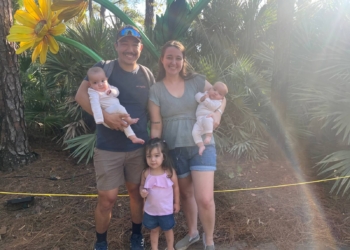Patience Riley discusses motherhood openly and honestly — the good, the bad and the ugly, as she puts it — to try to ensure no one feels unprepared for its realities.
Patience, a military spouse in Georgia, is a certified professional coach and licensed professional counselor. She has specialized training in perinatal mood disorders, which encompass pregnancy up to about a year postpartum, and also works with clients who’ve lost babies.
“Teaching complex mental health tools in a simple way gives me life,” she said.
Patience has a private counseling practice and became interested in perinatal mood disorders to better help her clients, she said. When she got pregnant and had her first child in 2019, it all hit home.
“That’s when I started to see it even more clearly,” she said.
 Patience experienced the loneliness and anxiety of the all-consuming task of caring for a baby, and the irritability and anger that stem from being sleep deprived. Her husband, 1st Lt. George Riley, went to officer training when their baby was about 4 months old, which exacerbated the situation.
Patience experienced the loneliness and anxiety of the all-consuming task of caring for a baby, and the irritability and anger that stem from being sleep deprived. Her husband, 1st Lt. George Riley, went to officer training when their baby was about 4 months old, which exacerbated the situation.
George has served in the Air Force for nine years and is an air battle manager at Robins Air Force Base. Originally from South Carolina, the couple recently celebrated their eighth anniversary and have two children, ages 2 and 4.
With her first child, Patience moved in with her parents until her husband had completed officer training, which helped tremendously, she said. Her experience after the birth of her second child in 2021 during the COVID-19 pandemic was more difficult because her husband deployed just after Thanksgiving. At the time, she was three months postpartum.
“We had just moved and, typically, you can start meeting people and creating your little village, your little community. But not with COVID. With the isolation came the depression,” she said. “I was the perfect ball of risk factors.”
Family and friends tried to visit as much as possible, and Patience forced herself to “white-knuckle it” for months, she said. Eventually, she and her young children went to stay with her parents for about a month, then her mother returned home with them for a week, just before George’s deployment ended in mid-April 2022. Finally, life started getting back on track, said Patience, who suspects she had undiagnosed postpartum depression.
There are several risk factors for perinatal mood disorders, including having family members who’ve been diagnosed with a mental health issue; having multiple children; being a single parent; being in the military; and having hormonal imbalances, Patience said.
A 2015 study showed that military wives dealing with a spouse’s deployment were most at risk for postpartum depression or postpartum anxiety, and those who were alone during the delivery had the overall highest risk.
“One thing that I will always share with my clients, regardless of who you are — your occupation, how much money you make — you are not exempt from having issues with your mental health,” she said.
Follow Whoa Mama on Instagram
The issue also can affect fathers: research shows that one in 10 are diagnosed with postpartum depression or postpartum anxiety, Patience said. The signs in fathers can be different, including anger, isolation and behaviors like spending more time at work or retreating into hobbies.
Getting adequate sleep is the No. 1 protective factor against perinatal mood disorders, Patience said.
“If your sleep is a mess, your mental health is a mess — regardless of who you are,” she said.
It’s imperative to develop a local support system in addition to the support of long-distance family and friends, Patience said. That’s easiest done while living on base; families living off-base can try befriending neighbors, meeting regulars at the local coffee shop, or connecting with others during yoga or gym class, she said. In fact, the latter approach combines the two main protective factors for mental health: movement and fellowship, she said.
There are many resources available to parents, like free virtual support groups offered by Postpartum Support International, for which Patience started volunteering in 2020. The organization offers more than 30 support groups on various topics, including loss and infertility. There are also groups for fathers, military mothers, Black mothers, Spanish speakers and more.
Virtual groups are an especially great resource for military members stationed outside of the U.S. who have fewer mental health resources at their disposal, said Patience, who leads a parents’ mindfulness support group. She’s also a substitute leader for a military moms support group.
 George said it was frustrating to know that his wife struggled while he was deployed. He tried to help by asking friends to bring her dinner and spend time with her, and focused on being a supportive listener, he said. Now, he tries to give her regular respite by cooking dinner or taking care of the children, he said.
George said it was frustrating to know that his wife struggled while he was deployed. He tried to help by asking friends to bring her dinner and spend time with her, and focused on being a supportive listener, he said. Now, he tries to give her regular respite by cooking dinner or taking care of the children, he said.
“I do think that it’s awesome that she is using her experience to help others,” he said. “I think she has a gift.”
A stigma among many in the military regarding discussing mental health can prevent people from seeking help, according to Patience. Some of her clients paid her out of pocket because they worried that, if they billed insurance, someone would find out; others waited to seek help because they didn’t want their male coworkers to believe they couldn’t handle things, she said.
“I just want our military folks — whether they are serving, or they are a spouse — to know you’re not alone,” she said. “There is support.”
People also should remember there isn’t a “right” or “wrong” time to ask for help, said Patience, who in August started working as communications manager with the Perinatal Mental Health Alliance for People of Color, a program within PSI.
“It’s OK to speak with a mental health professional when things are going well, so they can stay well, or when life is challenging.”
Visit Postpartum Support International (PSI) for support and resources:
- Call or text the PSI HelpLine at 800-944-4773.
- Visit postpartum.net for additional resources and free online support groups
- Visit psidirectory.com to view the PSI online perinatal mental health provider directory











































